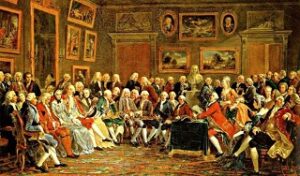
The Lights of Enlightenment
We still live under the aegis of the Enlightenment, the strong movement of 18th century Europe, its principles seemed to lead to a perfect society speaking of freedom and equality among human beings, wishing to abolish both the powers of realization and the influence of Christian religiosity, Voltaire and Diderot were the most radical thinkers, but you can’t help but feel the influences of Immanuel Kant, Adam Smith, David Hume and Montesquieu.
Europe, its principles seemed to lead to a perfect society speaking of freedom and equality among human beings, wishing to abolish both the powers of realization and the influence of Christian religiosity, Voltaire and Diderot were the most radical thinkers, but you can’t help but feel the influences of Immanuel Kant, Adam Smith, David Hume and Montesquieu.
Ernest Cassirer makes one of the important treatises on the Enlightenment, quotes Diderot: “The Author of nature, who will not reward me for having been a man of spirit, will not condemn me to eternal punishment for having been a fool” (apud Cassirer, 1992, p. 224), but the author corrects both the aspect of tolerance, it is necessary to remember the wars between Lutherans and Catholics involving different reigns and the peace of Westphalia, and the aspect now of a free religiosity that “is no longer a gift of a supernatural power, of divine grace; it must spring from the action itself and receive its essential determinations from the action” (Cassirer, p. 225).
The idea also developed by Cassirer of a “pure” intellectualism, on the one hand puts a primacy of thought over pure theoretical speculation and on the other hand seeks to found a religion “in the pure limits of simple reason”, of course without faith, without the mystery (which is part of nature) is no longer religion.
Cartesian insufficiency and reductionism, a strong argument of Cassirer to the Enlightenment, made several philosophers seek roots in Eastern philosophy, Cassirer reminds Leibniz that he had already “quoted Chinese civilization” and in the Persian Letters, Montesquieu makes a comparison between East and West, but it will be Schopenhauer (Upanishad) and Nietzsche (Zaratrusta) who, under these eastern influences, will break with Enlightenment philosophy.
Leibniz is not directly contested, but his disciple Wilhelm Wolff, who “celebrates Confucius as a prophet of great moral purity and places him on a par with Christ” (Cassirer, p.226), will be the target of Voltaire’s irony in his famous “Candido, or optimism” (1759), criticizes the idea of “the best of all possible worlds”.
In the economic aspect, it was important to overcome the philosophy of mercantilism and develop liberal theory (especially Ada, m Smith) on the concept of the economy of nations, but liberalism will develop more broadly with the idea of financial capital by David Ricardo (1772-1823).
The civilizational crisis that we pointed out in last week’s posts (and previous ones, of course), has its roots in the Enlightenment and its ideas of state, religion and freedom, but as Cassirer points out, it is important to “reject the literal meaning of the Bible every time it is mentioned. finds expressed the obligation of an act that contradicts the elementary principles of morality” (p. 228), but in his Treatise on Tolerance (1763), a law of the intellectual world is traced “that reason only exists and subsists if it is recreated day after day” (p. 229).
Cassirer’s development however is that “one cannot decide on their point value apart from their moral efficacy. This is Lessing’s meaning of the apologue of the ring: the ultimate and profound truth of religion is only proved from within” (p. 230).
For these philosophers, only objectivity (the relationship with the external object) is knowledge, and this is achieved in a “transcendence” of the subject in relation to the object, thus there is no sense or value in a moral asceticism, thus for them religion is religion. natural, although they do not have a good relationship with nature.
CASSIRER, Ernest. (1992) A filosofia do Iluminismo (The Philosophy of the Enlightenment). Trans. Alvaro Cabral. Brazil, Campinas, SP: Editora da Unicamp.









